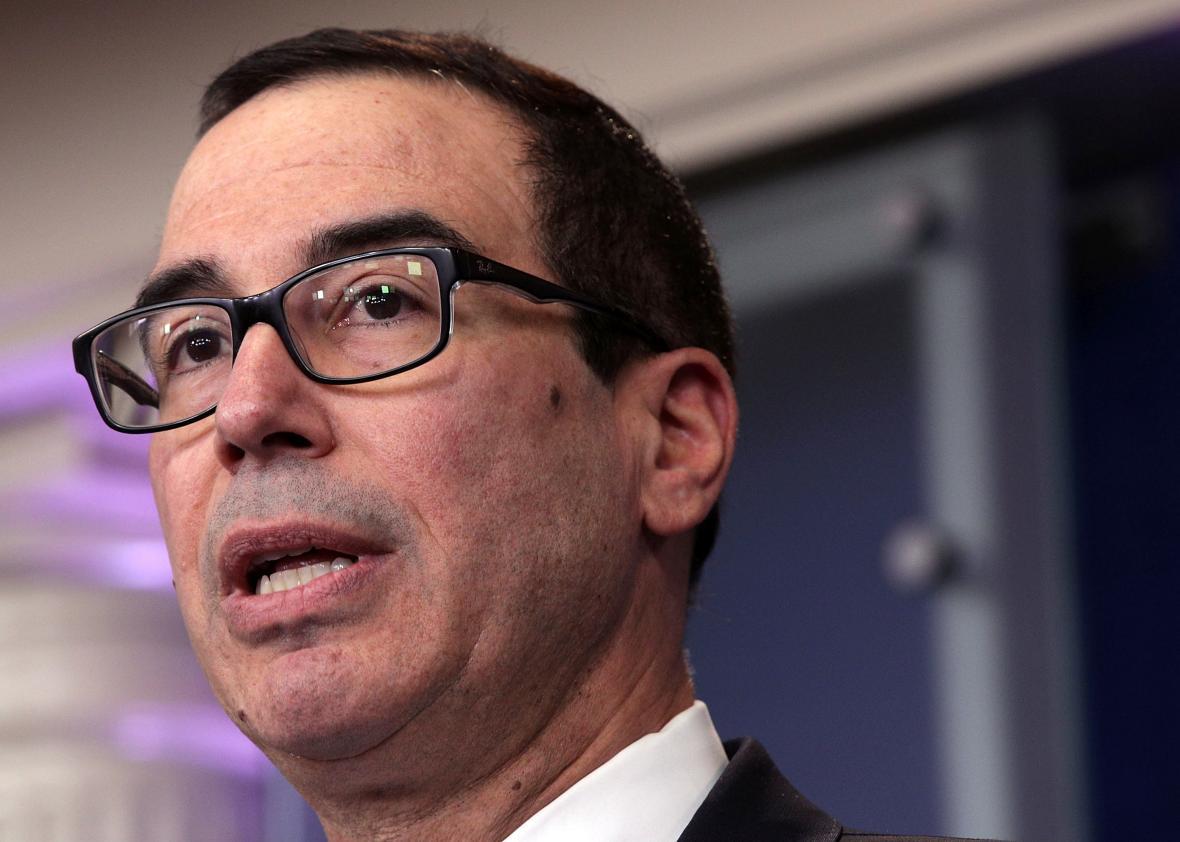“This is a mark-to-market business, and you see what the market thinks.” That was Treasury Secretary Steve Mnuchin telling CNBC on Thursday morning that, yes, of course President Trump deserves credit for the 10 percent stock market rally since Election Day. Every day, Mnuchin argued, the stock market functions as a report card, a sort of running poll on the success or failure of the administration.
In this schema, traders and investors wake up every morning, look at the resident of the White House and the policy pronouncements emanating from the administration, and decide whether they think stock returns will be positive or negative in the future. They are participating in a sort of online daily tracking pool, but with real money at stake.
You hear this kind of argument a lot from financiers and financial pundits—but only when two things are happening: a Republican is in the White House, and the stock market is going up.
This is an old intellectual tic of Republican market types. If the stock market rises when a Democrat is president, he’ll get no credit. During Bill Clinton’s presidency, for example, the S&P 500 quadrupled. But right-wingers, who predicted the economy would plunge into recession when Clinton raised taxes on the wealthy in 1993, didn’t regard the 1990s bull market as a report card on the Clinton administration. Instead they ascribed the longest peacetime expansion in history to other factors: like the brilliance of Federal Reserve Chairman Alan Greenspan, the dot-com boom, NAFTA, the end of the Cold War, or the Republican takeover of Congress in 1994.
When George W. Bush came into office and promulgated tax cuts, easy money, and loose regulation of Wall Street, the switch was flicked. Supply-siders and Republicans were quick to ascribe any gains in the economy and the market directly to the president. It was the Bush Boom, as Jerry Bowyer argued in a 2003 book. Or “The Greatest Story Never Told,” as Larry Kudlow put it in National Review in 2006. But the boom was followed by a crash. In the eight years of George W. Bush’s presidency, the S&P 500 returned less than nothing.
Was this a judgment on the efficacy of Bush’s tenure? Of course not. The Wall Street Journal op-ed page and Republicans absolved Bush of all blame—how absurd to think a president has anything to do with the markets! They blamed the Federal Reserve, the Community Reinvestment Act, Barney Frank, subprime lenders.
You know what’s coming next. President Obama inherited an economy and stock market in free fall. Under his tenure, the market bottomed and then enjoyed an extraordinary resurgence. Between March 2009 and Nov. 8, 2016, the S&P 500 nearly tripled. The stimulus package, the bailouts, the Affordable Care Act, the appointment of Janet Yellen. Republicans assured us that every one of these steps would mean disaster for the markets and the economy. By and large, however, these moves worked. And the policies of aggressively guaranteeing every financial asset in existence proved to be a particular boon to banks. In fact, the Obama-era bull market and reflation enabled Steve Mnuchin to mint his fortune on One West.
Of course, throughout the Obama years, Republicans and right-leaning market analysts steadfastly refused to mark the Obama presidency to the market, or vice-versa. The stock market was rising because interest rates were low, because it was all a giant bubble, because companies were brilliant at finding new ways to profit, because of Silicon Valley innovation. How absurd to think that the stock market is some kind of report card on the president!
And here we are again. Never mind the immense gains in the stock market over the last eight years, or the eight years of economic expansion, or the record string of monthly job gains. Now that there’s a Republican in the White House again, Mnuchin’s simple-minded analysis goes, we’re really going to have prosperity. And it will all be due to the brilliance of the 45th president.
Marking your reputation—or company value or success or presidency—to the market is a really good idea when markets are booming. Those in charge are eager to claim credit for the valuations they get at the top. But the minute the market plummets, marking to market doesn’t sound like such a good idea. In fact, during the financial crisis, right-wingers suggested we should just suspend mark-to-market accounting to spare Wall Street banks from the carnage.
The minute the markets turn south, I would fully expect Steven Mnuchin to suggest that we do the same with regard to President Trump.
